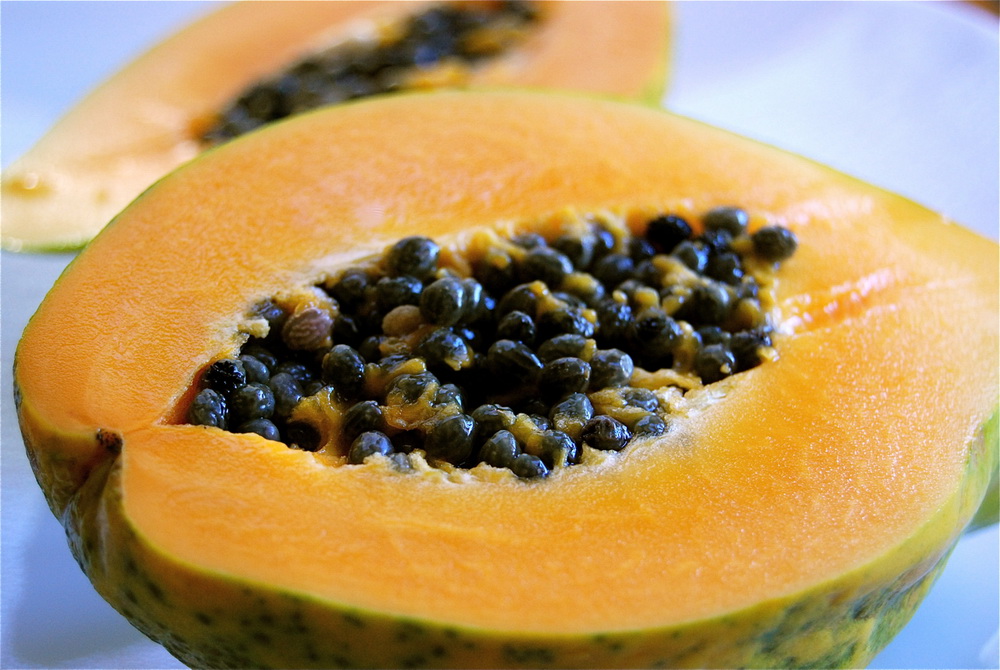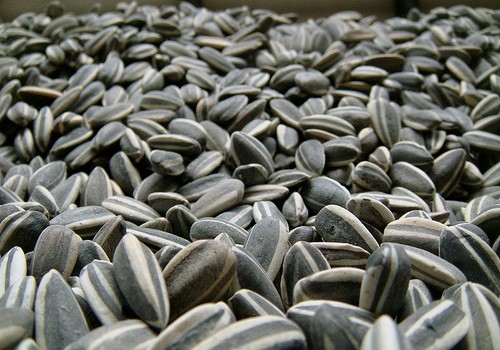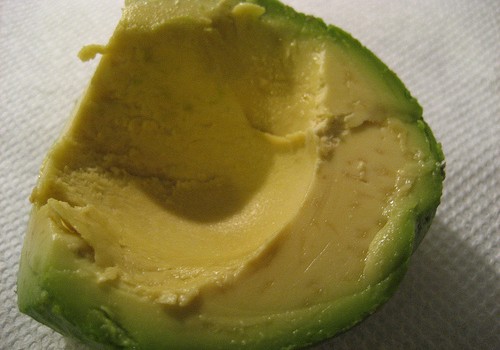
Papaya Is Very Rich In Vitamins A And C Which Contribute To Your Good Mood
Vitamin C is thought to protect against many diseases, though sometimes the evidence for this belief is a little shaky. It's certainly a powerful antioxidant, protecting the body's tissues from damage from free radicals. But it may also have a role in suppressing cortisol production. Cortisol is the hormone that triggers the cascade of other stress hormones, and very high doses of vitamin C have been found to reduce cortisol production. But you'll need to get your hands on very large amounts: way more than the recommended daily dose for vitamin C, which at 60mg a day is based on the amount needed to prevent the onset of scurvy. Try somewhere around 1000mg a day, instead. We probably evolved to eat a diet extremely rich in vitamin C, eating a tropical diet rich in vitamin C from fruits. Fruits like Papaya, which contains an average of 235mg of vitamin C, over a quarter of the super-high dose associated with reduced stress symptoms. Papaya also contain high doses of vitamin A, which contributes to recovery from cell damage and helps the body cope with stressors.

The Great Source Of Vitamin E That Is Sunflower Seeds
Sunflower seeds are a great snack, but they offer more than that. 100 grams of sunflower seeds contains 36mg of vitamin E, more than 200 times the recommended daily intake. That's important because of the key role that vitamin E plays in protecting the body from the physical effects of stress, including its antioxidant effects and its protective role for several protein compounds involved in tissue regeneration. Vitamin E also helps in some cell-to-cell communications in the body, making it a vital nutrient offering protection from the physical effects of the stress response.
- Important notification about information and brand names used in this slideshow!
- Photo courtesy by Marie Aschehoug Clauteaux on Flickr : www.flickr.com/photos/marie-aschehoug-clauteaux/5118023409/
- www.oprah.com/oprahradio/Foods-That-Help-Relieve-Stress

Stress Is a Modern Day Serial Killer
Stress can contribute to reduced immune system function, tiredness and soreness, depression, anxiety, panic attacks, heart disease, skin problems, autoimmune issues, colds, and failing cognitive function. If you can cope with it, stress is actually good for you in many cases, but an overload of it can do you real harm. While there are a wide range of strategies to cope with stress, one base you should definitely cover is what you're putting in your body, so here are 10 simple nutrition rules to help you cope better with the stresses you face. Ranging form ways to protect your physical health to mood boosting chemicals in common foods, this guide means you'll beat the blues in no time.
- Important notification about information and brand names used in this slideshow!
- Photo courtesy by Cayusa on Flickr :http://www.flickr.com/photos/cayusa/814985254/
- www.helpguide.org/mental/stress_signs.htm

The Most Common Causes Of Stress
Stress is usually caused by a problem you need to solve, but can't solve right away. Bills that need paying, that sound from the car that's going to grow up into a costly trip to the garage, troubles with loved ones, are all things that can cause excessive stress. And your body doesn't distinguish between physical and mental stress; it doesn't know the difference between a pile of late bills and a life-or-death situation, and it reacts accordingly, releasing the cascades of hormones associated with the fight-or-flight response. Common causes of stress include major life changes, financial problems, being too busy, relationship troubles, and of course work and children and family. Other causes can be internal, like negative self-talk, prefectionism or a lack of assertiveness.
- Important notification about information and brand names used in this slideshow!
- Photo courtesy by Michael Gil on Flickr :http://www.flickr.com/photos/msvg/4476789745/
- www.helpguide.org/mental/stress_signs.htm

Another Southern Fruit, Avocado, Contains Much Healthy Fats
Avocados contain a range of nutrients and are unique in the world of fruits because of their high fat content. Of the 285 calories in half a large avocado, 25% comes from fats. But avocado fats are a mix of highly heart-healthy monounsaturates that help clear artery-clogging saturates from the bloodstream. They're also a great source of Omega-3 fatty acids, more commonly sourced from fish. Omega-3 fatty acids have been found to help reduce the amount of cortisol released in response to stressful situations, so avocados with their high vitamin content and rich Omega-3 content too are an ideal stress-busting food.

Try To Eat As Much Food Rich With Omega-3 Fatty Acids As You Can
Omega-3 fatty acids play a vital role in stress reduction. For one thing, they may help to protect the heart against the detrimental effects of mental stress. Omega 3 can also reduce the production of an inflammatory hormone called cytokine. This hormone is part of the body's natural stress hormone cascade and it has a role in reactions to short term physical stress, but it contributes to negative effects of long-term mental stress. Omega-3 can reduce subjective feelings of stress by up to 20% -no small increment.

Popeye's Favorite Food Is Good For You, Too
Notoriously, the iron content of spinach was grossly overrated in the early 20th century, reportedly as a result of a research scientist tasked with determining it putting a decimal point in the wrong place! But spinach, and other dark green leafy vegetables like it, has plenty of other stress-busting health benefits. First amongst these is its high magnesium content, which helps combat stress by regulating blood pressure. Blood pressure spikes when we're stressed, and increased magnesium intake can cut down blood pressure spikes. 3 cups of spinach can give you 40% of your daily magnesium needs, so try adding it to salads of sandwiches.

Endorphin From Chocolate Makes You Happier
Eating chocolate makes some people report feelings of happiness and relaxation, probably partly due to chemicals present in the chocolate itself and partly because of the pleasure they experience when eating it. Chocolate doesn't actually contain endorphins, though eating it can stimulate the production of these brain chemicals. Chocolate does contain several mild sedatives, including anandamide, which binds to the same receptor sites in the brain as cannabis' active ingredient, THC, though it's far less potent. Chocolate also contains a caffeine-like stimulant called theobromine. This combination of sedatives and stimulants probably explains part of chocolate's mood-lifting effects.

Drinking Juices And Lemonade Gives You Much Needed Folic Acid
Drinking orange juice and lemonade can offer you an important source of folic acid. Folic acid has important effects in the womb, helping to protect against spinal cord defects like spina bifida. But in adults it's good for stabilizing mood and improving resistance to stress. While folic acid is involved in iron metabolism and that's its most well-known application - doctors prescribing iron supplementation will sometimes prescribe folate supplements too - it also seems to help in a lot of mental problems, including schizophrenia, but also in depression, and high folate intake helps reduce stress. So it's a good idea to eat as much folate-containing foods as you can, and to drink juices that contain it too.

Avoid Alcohol And Reduce Sugar Intake
Alcohol can seem to be relaxing us, and to a certain extent it really is. But it causes rebound hyperglycaemia too - after drinking you feel sleepy, but after a few hours your blood sugar returns to normal and you wake up, headachey and unable to sleep. Sugar causes shark peaks and troughs in blood glucose levels, leading to mood instability and difficulty sleeping as well as being strongly implicated in diabetes. Both alcohol and excessive sugar consumption can prevent proper sleep and sleep is one of your body's best defenses against stress.



























Your thoughts on this
Loading...